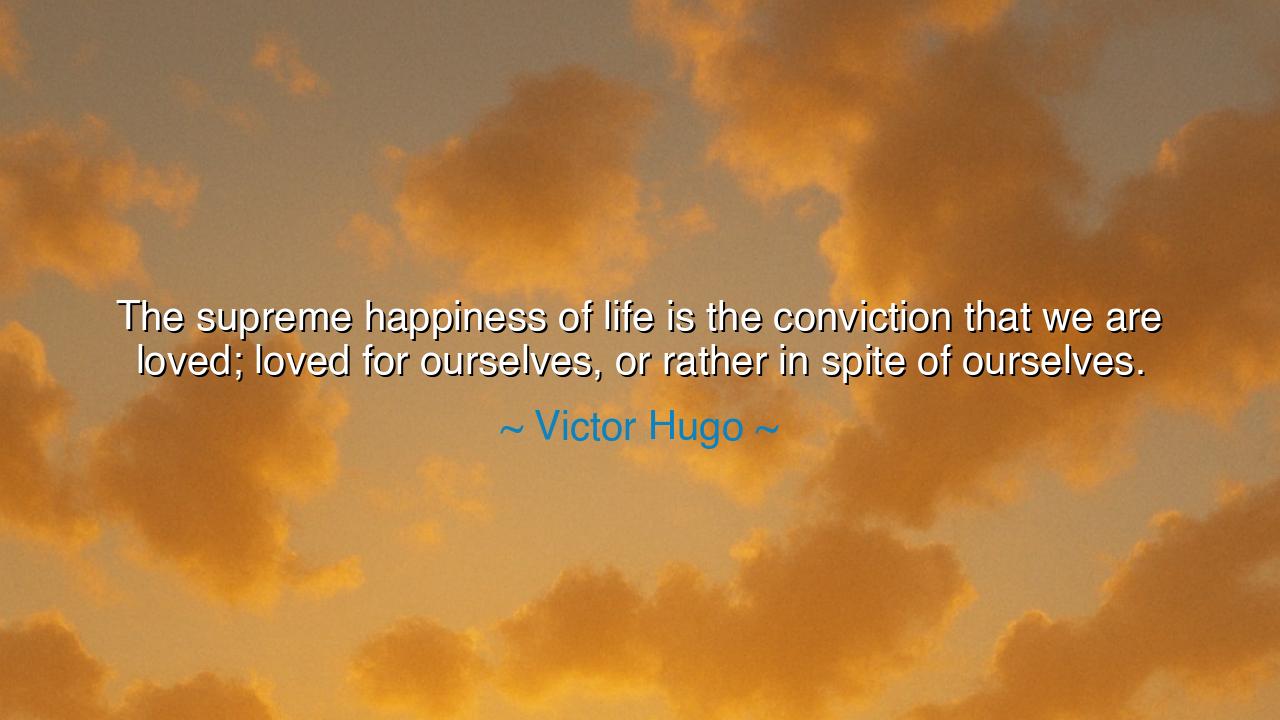
The supreme happiness of life is the conviction that we are
The supreme happiness of life is the conviction that we are loved; loved for ourselves, or rather in spite of ourselves.






The great French writer Victor Hugo, whose words carried both thunder and tenderness, once declared: “The supreme happiness of life is the conviction that we are loved; loved for ourselves, or rather in spite of ourselves.” In this single line, he touches the deepest longing of the human heart—the yearning not merely to be admired for our virtues, but to be accepted despite our flaws. For what joy could surpass the peace of knowing that another sees us in our entirety—the light and the shadow, the triumphs and the scars—and loves us still? This, Hugo tells us, is the supreme happiness of life, greater than wealth, glory, or power: to be known, and yet not rejected.
Hugo’s words are not born of sentiment alone; they rise from the well of human truth. He who wrote Les Misérables knew the spectrum of the soul—the sinner and the saint, the wretch and the redeemed. In the quiet between his storms of thought, he saw that love, when pure, does not depend upon perfection. Rather, it flourishes in the soil of imperfection. To be loved “for ourselves” may flatter us, but to be loved “in spite of ourselves” humbles and redeems us. It is to stand naked before another’s heart and find no judgment there, only mercy. Such love reflects not the affection of the moment, but the divine patience that endures beyond error, beyond time.
Throughout the ages, poets, prophets, and philosophers have sought this truth. It is what moves the hearts of lovers, what binds parents to their children, and what gives saints their faith. Yet, it is also the rarest of treasures, for it demands that one see beyond appearances—to the soul itself. Superficial love celebrates what is bright and beautiful; true love embraces even the brokenness. It does not turn away when the face grows weary or the spirit falters. It whispers, “You are loved still.” To find this love is to find rest at last, for it silences the ceaseless striving to prove one’s worth.
Consider the tale of Jean Valjean, Hugo’s own creation—a man cast out by the world for stealing a loaf of bread. Branded a criminal, he lived in the shadows until an act of undeserved mercy transformed him. A bishop, wronged by him, forgave him instead of condemning him. That forgiveness—love given in spite of his sin—became the spark that redeemed his life. In that moment, Valjean discovered the truth of Hugo’s words: that the soul’s greatest joy is not to be praised for virtue, but to be loved in the face of unworthiness. It is such love that awakens the divine within man.
We see this same truth in the story of Mary Magdalene, once condemned and despised, yet found worthy of grace. When Christ looked upon her, he saw not her past, but her soul. His love did not erase her faults—it transcended them. From this love sprang her transformation, her courage, and her peace. So it is with all who have ever been lifted by compassion greater than their shame. The power of being loved “in spite of ourselves” is the power that saves, renews, and gives life meaning.
Yet Hugo’s wisdom also cuts both ways—it reminds us that to receive such love, we must also learn to give it. To love another truly, we must not demand their perfection, nor turn away from their flaws. We must see the human beneath the mask, the wounded beneath the proud. Love that endures imperfection becomes a holy act, a rebellion against the coldness of judgment. It is easy to love beauty; it is divine to love humanity. Those who learn this secret walk the earth as healers of hearts.
So let this be the lesson: seek not love that flatters, but love that forgives. And give not love that demands, but love that understands. Strive to be worthy of neither idolization nor despair, but of honest affection—the kind that sees your darkness and calls it part of your story. To those who find such love, life’s burdens grow lighter, for they no longer fight to prove their worth; they rest in the truth that they are enough.
Thus, as Victor Hugo teaches, when the heart knows it is loved—not for what it has done, but for what it is—it becomes unshakable. This is the supreme happiness: to stand, imperfect yet cherished, flawed yet forgiven, and to feel in the depth of one’s being that love has chosen to stay. For to be loved in spite of ourselves is to taste eternity in mortal form—and to understand, at last, what it truly means to be human.






AAdministratorAdministrator
Welcome, honored guests. Please leave a comment, we will respond soon